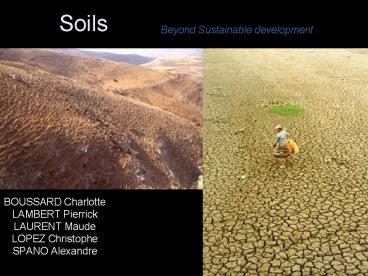Soils PowerPoint PPT Presentation
1 / 28
Title: Soils
1
Soils
Beyond Sustainable development
- BOUSSARD Charlotte
- LAMBERT Pierrick
- LAURENT Maude
- LOPEZ Christophe
- SPANO Alexandre
2
Focusing on
- Desertification
- Agriculture
- Soil fertility
- Salinisation
3
Desertification
4
DEFINITION
- Degradation of land in arid, semi-arid, and
dry sub-humid areas - The environmental
formation or development of a sand desert-a
deterioration process. A desert is the last or
terminal result of the process and reflects a
distinct geographical environment - Caused
primarily by human activities and climatic
variations - Poverty, political instability,
deforestation, overgrazing, and bad irrigation
practices can all undermine the land's fertility
- Over 250 million people are directly affected
by desertification
5
(No Transcript)
6
(No Transcript)
7
(No Transcript)
8
Causes
- Desertification comes mainly from variations
in climate and from human activities. - Climatic variations High temperatures lasting
for months create droughts that prevent the
vegetation from growing. - Human activities related to agriculture
- - overgrazing removes the vegetation cover
that protects - it from erosion - overcultivation exhausts the
soil
9
- - deforestation destroys the trees that bind
the land to the soil. Wood is the principal
source of domestic energy for lighting and
cooking in many arid areas. - poor irrigation
practices raise salinity, and sometimes dry the
rivers that feed large lakes the Aral Sea and
Lake Chad have shrunk dramatically in this way.
The intensification of human activities brings
an increased greenhouse effect, causing global
warming. Drylands are likely to be especially
vulnerable to rises of temperature during the
21st Century.
10
Impacts of desertification on
Desertification affects all aspects of life,
highlighting how much environment and livelihoods
are interlinked. Environmental impacts
Because of the vegetation loss, desertification
makes areas more flood-prone. It also causes the
salt level in soil to rise, results in
deteriorating quality of water, and silting of
rivers, streams and reservoirs. Economic
impacts huge economic consequences the World
Bank estimates that at the global level, the
annual income foregone in the areas affected by
desertification amounts to US 42 billion each
year, while the annual cost of fighting land
degradation would cost only US 2.4 billion a
year.
11
Scenes of dead baby camels are not uncommon in
Innner Mongolia. Mother camels do not have enough
milk for the baby camels because desertification
has eroded much of the grassland
- Poverty and mass migration Land degradation
brings hunger and poverty. People living in areas
threatened by desertification are forced to move
elsewhere to find other means of livelihood. - Mass migration is a major consequence of
desertification. - From 1997 to 2020, some 60 million people are
expected to move from the desertified areas in
Sub-Saharan Africa towards Northern Africa and
Europe.
12
Dead animals
13
Mass migration
14
(No Transcript)
15
EXEMPLE IN AFRICA
16
Institutions
- FAO
- Global Mechanism hosted by IFAD
- OECD Club du Sahel
- Office to combat Desertification and Drought
(UNSO) - OSS
- UNEP
- United Nations Interim Secretariat of the
Convention to Combat Desertification - World Bank
- The International NGO Network on Desertification
and Drought - RIOD - Desertification Information Network (CEO)
- World Overview of Conservation Approaches and
Technologies (WOCAT) - Fertilizer Advisory, Development and Information
network for Asia and the Pacific (FADINAP) - Climate Network Africa (CNA)
- Fundación Forum Ambientál - Centro de seguimento,
prevención y reforma de la sequia y la
desertización - MED Forum, Mediterranean NGO Network for Ecology
and Sustainable Development
17
Examples of actions
- Competition
- Imaging one Year UN launches logo contest for
2006 International year of deserts
desertification - Winner to receive US 5,000 Submissions to be
sent by April 4, 2005 - The World Day to Combat Desertification and
Drought, celebrated every year the 17th of June,
marks the anniversary of the adoption of the
United Nations Convention to Combat
Desertification (UNCCD), in 1992, based on a
recommendation of the Rio Earth Summit.
18
Agriculture pollution
19
Causes
- Fertilizers, ammonia, pesticides, livestock
waste, oil, toxins from farm equipment, .
20
Consequences
- Agricultural pollution is the leading source of
water quality impacts to rivers and lakes. - Animals and fish contamination
- Pollution of drinking water
- Health problems
21
Some solutions
- Use fertilizers sparingly. Test the soil to see
the amount of fertilizer needed. - Don't fertilize before a rain storm.
- Use organic fertilizers that release nutrients
more slowly.
22
Soil fertility
23
Impact of agriculture and the food industry on
soil
- The amount of carbon released from the soil into
the atmosphere tripled between 1945 and 1986 - Surexploitation of farming is a danger for soils
because they become less and less fertile - Soils in fallow become seldom because cultivation
has become very intensive
24
Solutions
- Find sustainable and healthy ways of producing
food and other products from the land - Promote sustainable agricultural systems like
Organic farming - Stop the continuing growth in international trade
of food, and encourage local sourcing instead
25
(No Transcript)
26
The Causes of Salinisation
- Rocks releases their natural salt into the soil
dissolved generally in rain water - Problems in the dry tropics
- Accumulation of salt in soil
27
Irrigation and Salinisation The Intimate
Connection
- Rise in groundwater levels is caused, by the
water lost through seepage from irrigation
channels - the 'evapo-transpiration' of plants leads to
salinisation - over-use of irrigation water helps to raise the
water table and hence further increase
waterlogging SALINISATION begins
28
Example of Sahel

